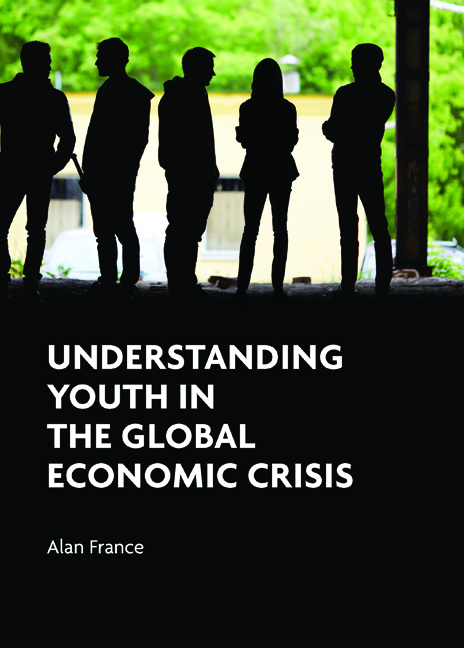Book contents
- Frontmatter
- Dedication
- Contents
- List of tables and figures
- About the author
- Acknowledgements
- Introduction
- One A political ecology of youth
- Two The global crisis and the ‘age of austerity’
- Three Education and training: the broken promise
- Four Education and training: from public good to private responsibility
- Five Unemployment and work: precarious futures
- Six NEETs and the disengaged: the ‘new’ youth problem
- Seven Divergence and difference: contrasting cross-national experiences of being young
- Eight Education, work and welfare in diverse settings
- Nine Youth and mobility: inequality, leaving home and the question of youth migration
- Ten After the crisis: social change and what it means to be young
- References
- Index
Eight - Education, work and welfare in diverse settings
Published online by Cambridge University Press: 01 September 2022
- Frontmatter
- Dedication
- Contents
- List of tables and figures
- About the author
- Acknowledgements
- Introduction
- One A political ecology of youth
- Two The global crisis and the ‘age of austerity’
- Three Education and training: the broken promise
- Four Education and training: from public good to private responsibility
- Five Unemployment and work: precarious futures
- Six NEETs and the disengaged: the ‘new’ youth problem
- Seven Divergence and difference: contrasting cross-national experiences of being young
- Eight Education, work and welfare in diverse settings
- Nine Youth and mobility: inequality, leaving home and the question of youth migration
- Ten After the crisis: social change and what it means to be young
- References
- Index
Summary
Introduction
The discussion in this chapter will look at how neoliberalism in Norway, Japan, Poland and Spain has influenced and shaped youth policy over the past twenty years. We will begin the analysis by focusing on the question of education and training, followed by an examination of the strategies that each country has developed for dealing with unemployment, work and welfare. The review will also show how the different states have been developing their post-16 education policies, highlighting the importance of the local context in how they are responding to the neoliberal agenda, especially since the 2007 crisis. We will also examine the significant differences in strategy not only between these four states but also in terms of how they vary with regard to the UK, Australia, Canada and New Zealand that were discussed in detail in the first part of the book.
Post-16 education and training
As we saw in Chapter Three, both the levels of participation and the number of qualifications that a young person gets have increased over the last fifteen to twenty years in all eight countries. Since the 2007 crisis, and throughout the recession, participation has continued to expand. However, differences continue to exist not only in the level of participation but also in how education and training is provided. In Norway and Spain, education is funded substantially from public funds, while in Japan education is run and managed fundamentally by the private sector. Poland, in its adjustment to a new European state, has created a partnership between public and private providers. One key feature in all eight countries is that young people's level of engagement in post-16 education is strongly influenced by what is happening to employment opportunities, although local factors also make a difference. This is clearly evident when considering Norway, Spain, Poland and Japan, and there are some interesting trends. In Norway, when the young were able to access good quality jobs (between 2000 and 2007), their level of involvement in education declined, but this changed in 2008 (OECD, 2014a). In Spain, the relationship between unemployment, work and local factors is more complex. The proportion of young people involved in post-16 education after the Franco period (in the 1970s) until 2007 was one of the lowest in Europe and the Organisation for Economic Cooperation and Development (OECD) countries.
- Type
- Chapter
- Information
- Understanding Youth in the Global Economic Crisis , pp. 187 - 216Publisher: Bristol University PressPrint publication year: 2016



